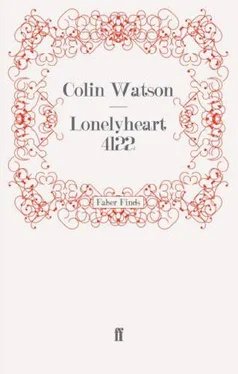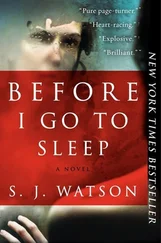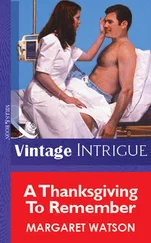He glanced into another window and wondered what possible trade could be represented by the display there of a potted geranium, a hank of clothes line and a carton containing two dozen bottles of syrup of figs. Its air of surrealism was not dispelled by the printed announcement, gummed to the glass: Wardrobes Bought.
“Morning, brother.”
Purbright turned. A thin, black-clad figure perched on a bicycle was wobbling over the road towards him.
“Good afternoon, Mr Leaper.”
The cyclist wore a clerical collar but he was obviously very young. He alighted and acknowledged Purbright’s correction with a half smile and a quick, nervous nod. Although he gave the impression of being eager about something, he ventured no further remark, but stood holding his handlebars and staring at the front tyre.
“Lovely in the sun,” Purbright said, and began to walk on.
“Yes,” said Leaper. “I’ve still some calls to do.”
The inspector watched him bend to his peddling and rapidly disappear up the street. He was sceptical about the calls. The Reverend Leaper’s charge was, in fact, the Eastgate mission, and its communicants were never anywhere else to be called on. “Out for a breather, I suppose,” Purbright concluded.
After a few more minutes’ walk, he reached a part of the pavement that broadened back to where a four storeyed building stood on its own. Tall railings flanked the three steps that led to double doors standing open in the shelter of a stone portico.
This was, or rather once had been, the Flaxborough Radical Club. It was said that Mr Gladstone had cut a rose from the bush that still grew in the little earth enclosure beside the steps.
Just inside the doors was a list of the offices above. Purbright looked vainly for the name Staunch or reference to a matrimonial agency. Then he noticed at the far end of the stone-flagged entrance hall an illuminated sign. It hung over a doorway and bore two words in bright green Gothic lettering on a pink ground.
“Handclasp House”.
Chapter Five
Purbright pushed open the door. He entered a small square room, carpeted from wall to wall in dark grey. A paler, pinkish grey was the colour of the hessian-like material that covered the walls. There hung from the ceiling a plain white globe. Three chairs in mushroom plastic were the only furniture. The place was like an optician’s waiting room—neutral, reticent.
Set diagonally across the far corners of the square were two more doors. A little orange bulb glowed in the centre of each. Purbright approached the door on his right. Like the other, it bore a notice.
When this light is on, MR DONALD STAUNCH is at the service of any gentleman who wishes to know how we can work to help him. Come straight in and make yourself at home.
He crossed to the other door, and read:
When this light is on, the free and friendly advice of MRS SYLVIA STAUNCH is available to our lady callers. Don’t knock: come in and have a chat with her.
Clever, thought Purbright. He could not have devised a better formula himself to avoid the unfortunate ambiguity of merely labelling the doors “Ladies” and “Gentlemen”.
Perhaps in the circumstances he ought to have a word with Donald first. He opened the right hand door and stepped through.
The contrast to the aseptic waiting room was almost startling.
In the light from a tall standard lamp behind a cushion-strewn oaken settle, the inspector saw what might have been a stage set for an English domestic comedy. Two armchairs separated by a coffee table faced a glazed hearth in which glowed the dummy embers of an electric fire. Upon a sideboard were glasses, decanter, biscuit barrel and miniature dinner gong. An open work-basket was beside one armchair, a rush stool by the other. He saw somewhere a pipe lying in an ashtray, a small scattering of hair curlers, a magazine open at the picture of a nude. The smell of the room seemed to be compounded of flowers and fresh laundry, with just a suggestion of...he sniffed—yes, newly baked bread.
Clever, he said again to himself. Very. Even the versatile “Rex” must have been a little awed by the insight and ingenuity of the Staunches.
“Do sit down, Mr er...”
He turned.
There had entered by a door on the farther side of the fire-place a woman with bluish grey hair, expertly waved and lustered, and the glint around neck and wrists of rather a lot of jewellery. Her eyes were strong and alert.
“Purbright,” he supplied. “Detective Inspector.”
Her smile narrowed for an instant to a pout. It emphasized her precise but heavy application of lipstick. Then the expression of businesslike solicitude was back.
She sat and ventured the small joke that seemed a proper way of getting a measure of the policeman’s attitude.
“I presume you are not here to offer yourself as a client, inspector.”
Purbright smiled back. “Hardly.”
“I thought not. You don’t look married, and that is the surest sign that you have a wife and are well content with her.”
“I shall tell Mrs Purbright that.”
He saw, now that she was seated, that the tailoring of her clothes was excellent. She had slim, rather hard-looking legs.
“You are Mrs Staunch, of course?”
She inclined her head.
“I’d rather expected”—Purbright indicated the door by which he had entered—“that it would be Mr Staunch whom I would find.”
“A small deception of the trade, inspector. I have a husband, but so far as the agency is concerned Donald is a fiction. I interview all my clients myself. It’s just that men seem to find the first step easier if they think they’re going to deal with a man. Once the ice is broken, they’re quite happy to pour out their troubles to me.”
“Your husband takes no part in the work then?”
“In this work? Heavens, no. He has far too much of his own. In any case, I’m afraid Donald doesn’t approve. He has the traditional English middle-class attitude to matrimonial agencies. Terribly infra dig .”
“Yet in no other country are people so insistent on the importance of being introduced. Isn’t that just your function? To effect introductions?”
Mrs Staunch spread her hands. “Precisely!” Her smile implied that she found Purbright a very sensible fellow indeed. “But you try telling that to an architect!” She deepened her voice on the last word in mock solemnity.
“Architect?”
“Donald. Well, an architectural consultant, actually. Next time you want your cells rebuilding, or whatever, send for Donald. He did a prison block once.”
“It is your help rather than your husband’s for which I should be obliged at the moment, Mrs Staunch.”
She bent forward attentively. “Of course.”
“There are two women—both of them live here in Flaxborough, or have done up to recently—whom we are rather anxious to trace. One is a widow. The other is an unmarried woman. We think that they may have approached your agency, probably within the last six months or so.”
“You mean these women have disappeared?”
“In effect, yes. Certainly some of the relatives are worried and no one has been able to suggest any likely reason why either should have left home.”
Mrs Staunch reached for a note pad that was lying on the coffee table. “You’d better give me their names.”
“Mrs Lilian Bannister—she’s the widow, of course—and the other one’s called Martha Reckitt.” He leaned forward and put two photographs on the table. Mrs Staunch finished writing and picked them up.
She looked at Purbright. “You think about six months ago?”
“In Mrs Bannister’s case, four exactly.”
She frowned. “Why ‘exactly’?”
“That was the date on a cheque for twenty guineas which she made out to you.”
Читать дальше












